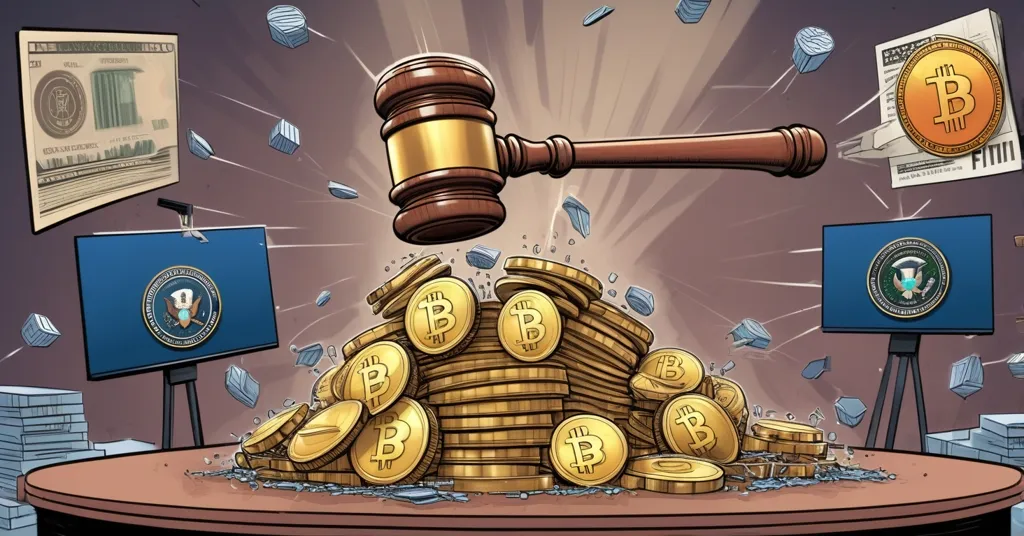CLS Global Hit with $428K Fine in FBI’s Crypto Fraud Crackdown

CLS Global Fined $428,000 in FBI’s Operation Token Mirrors Crackdown on Crypto Market Manipulation
In a significant blow to fraudulent practices in the cryptocurrency market, the FBI’s “Operation Token Mirrors” has led to a $428,000 fine for CLS Global, a UAE-based crypto market maker caught engaging in wash trading. The sting operation, launched in March 2024, underscores the ongoing battle against market manipulation and highlights the collaborative efforts of regulatory bodies to clean up the crypto space.
- CLS Global fined $428,000 for wash trading FBI’s bait token, NexFundAI
- FBI’s Operation Token Mirrors results in $25 million crypto seizure
- SEC charges against CLS Global and other firms underscore regulatory crackdown
On April 2, 2025, CLS Global faced justice in a federal court in Boston, receiving not only the hefty fine but also a three-year probation sentence. After pleading guilty in January 2025 to wash trading NexFundAI, a token created by the FBI to lure fraudulent traders, CLS Global is now barred from offering services in the U.S. This move sends a clear message to other potential manipulators: the era of unchecked fraud in the crypto market is coming to an end.
“Operation Token Mirrors” was a meticulously planned sting operation that exposed CLS Global and led to the seizure of $25 million in cryptocurrency, along with the shutdown of multiple wash trading bots. This operation’s success demonstrates the FBI’s commitment to rooting out fraudulent practices in the crypto market, a sector long plagued by such activities. Wash trading, the deceptive practice of trading the same asset back and forth to fake market activity, misleads investors about an asset’s liquidity and demand, creating a false sense of market activity.
The Securities and Exchange Commission (SEC) played a crucial role in this crackdown, filing fraud charges against CLS Global and other firms such as ZM Quant Investment and Gotbit Consulting in October 2024. These actions are part of a broader effort to protect investors and maintain market integrity in the face of rampant market manipulation.
According to a January 2025 Chainalysis report, wash trading accounts for an estimated $2.57 billion in trading volumes within the crypto market. This staggering figure highlights the scale of the problem and the need for continued vigilance. The crackdown on CLS Global is a stark reminder of the widespread nature of market manipulation, with other notable cases including Galaxy Digital’s $200 million settlement over LUNA token manipulation and SEC charges against Justin Sun for manipulating BitTorrent (BTT) and Tron (TRX).
The regulatory landscape is evolving, with authorities worldwide focusing on the crypto market to protect investors and maintain market integrity. The FBI’s “Operation Token Mirrors” and the SEC’s legal actions are part of this broader trend, reflecting an increased commitment to tackling the unique challenges posed by digital assets. As the crypto industry continues to grow, the fight against fraudulent practices like wash trading and market manipulation remains crucial.
These regulatory actions could have a silver lining for Bitcoin, often seen as a more transparent and less manipulated asset. Increased scrutiny might enhance Bitcoin’s reputation and drive adoption among those seeking a safer investment in the crypto space. However, altcoins and other blockchains may face similar challenges or benefit from increased legitimacy, depending on how they navigate these regulatory waters.
While these crackdowns aim to clean up the market, they also raise concerns about potential overreach by authorities, which could threaten the ethos of decentralization and privacy that many in the crypto community hold dear. The delicate balance between regulatory action and preserving the core values of the crypto world remains a contentious issue.
In the spirit of effective accelerationism (e/acc), these regulatory moves might accelerate the adoption of more robust and transparent crypto systems. As the market matures, those who champion transparency and integrity may find themselves at the forefront of this financial revolution. Let’s hope the next big thing in crypto isn’t another $428,000 fine but a step towards a more trustworthy and decentralized future.
Key Takeaways and Questions
- What was the purpose of the FBI’s “Operation Token Mirrors”?
The purpose was to expose and combat wash trading and other fraudulent practices within the cryptocurrency market by using a bait token, NexFundAI, to lure and identify perpetrators.
- How much was CLS Global fined, and what additional penalties did they face?
CLS Global was fined $428,000 and received a three-year probation, during which they are banned from offering services in the U.S.
- What other companies were charged alongside CLS Global by the SEC?
ZM Quant Investment and Gotbit Consulting were also charged by the SEC for participating in the wash trading scheme.
- What is the estimated impact of wash trading in the crypto market according to Chainalysis?
Wash trading accounts for an estimated $2.57 billion in trading volumes within the crypto market.
- What other notable cases of crypto market manipulation were mentioned?
Galaxy Digital’s $200 million settlement over LUNA token manipulation and SEC charges against Justin Sun for manipulating BitTorrent (BTT) and Tron (TRX) were mentioned as other notable cases.
- How might these regulatory actions impact Bitcoin and other cryptocurrencies?
Increased regulatory scrutiny could enhance Bitcoin’s reputation as a more transparent and less manipulated asset, while altcoins and other blockchains may face similar challenges or benefit from increased legitimacy.
- What are the potential implications for decentralization and privacy in the crypto world?
While regulatory actions may clean up the market, they could also threaten the ethos of decentralization and privacy, raising concerns about overreach and its impact on the crypto community’s core values.



